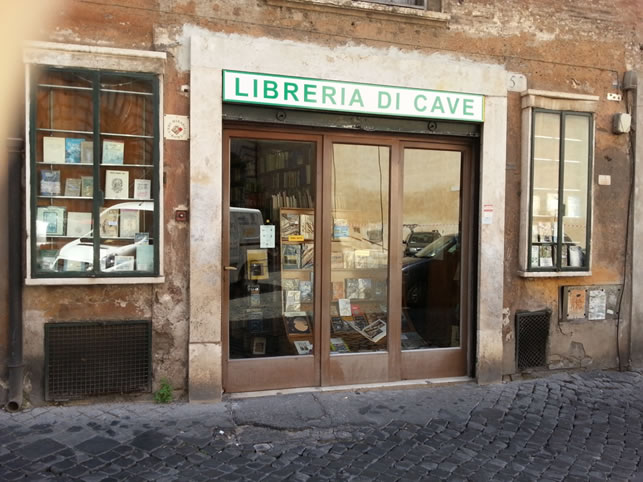
THE HISTORY OF A ROME BOOKSHOP(all photos courtesy Luciano Di Cave collection)

In our family they were bankers, surely after 1870, when, with the fall of the Papal States, Jews were at last free to practise any profession or to ply any trade. It may appear odd that, from the large halls of a Bank we arrived to a small shop of second-hand books, but the ups and downs of life are unforeseeable. Tragic events marked the destiny of our family, the bank disappeared and, with it all the financial resources. Furniture, jewels, money, everything was swallowed by the crash.
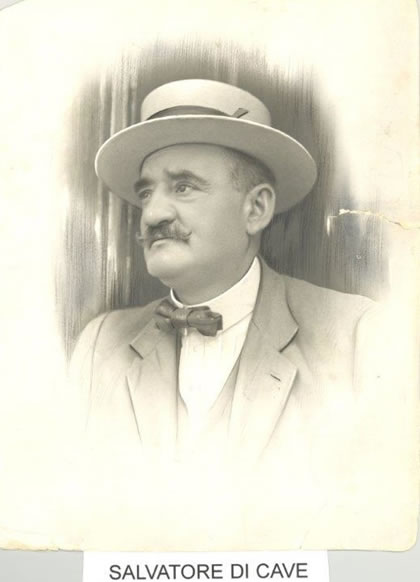
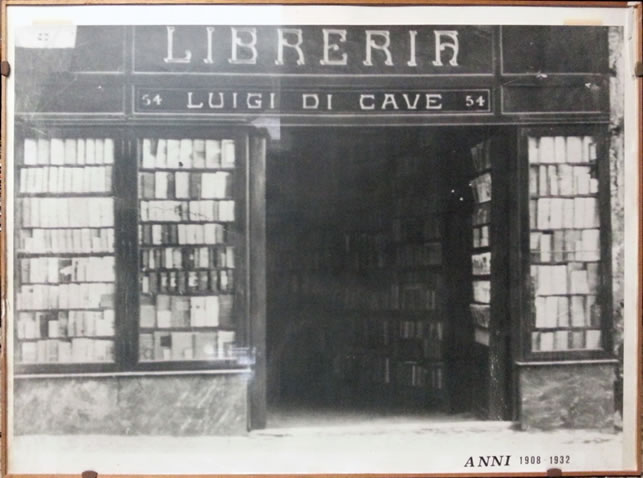
My grandfather, Salvatore Di Cave, had married the daughter of a good lyric tenor, Moses Spizzichino. The latter, I am sure. developed his career under a different name, which I don’t know. I had an old photo of my great-grandfather in “il Trovatore” and one of my cousins owned a miniature with his portrait, surrounded by precious diamonds. When, after the liberation of Rome, in 1944, we came back to our homes all things were stolen or destroyed.
Salvatore Di Cave and his wife Adele had five children, two males, Raniero and Luigi and three females with names that could be connected with lyric operas: Fedora, Zaira, Pia. My grandmother died still young, a short time after the birth of her last son, Luigi, my father. After many reflections, with the scarce financial resources he still had, Salvatore Di Cave established his first shop of second-hand books in 1906 in the center of Rome, exactly in Piazza di pietra, famous for the old Temple of the Emperor Adriano, and allotted it to his elder son, Raniero. Two years later, in 1908, he founded another shop not far from the Pantheon and allotted it to his younger son, Luigi. His elder daughter, Fedora, married a cuirassier. The cuirassiers were the Guards of Honour of the King and they should be tall and handsome. My aunt’s husband left the Army and Salvatore opened for him another shop, in Via Alessandria (near the historic Porta Pia), this time without books: only cameras and spectacles. A fourth shop was opened for his younger daughter, Pia, near the Piazza Navona. The shop was stocked with books, cameras and spectacles. My father was born in 1894, he was still young when my grand-father opened the second shop, but, some years later, at the outbreak of the First World War, my uncle Raniero was recalled for military service. Salvatore took his place in his first shop and left the second to Luigi, my father. My father escaped the military service for a serious attack of pyorrhoea, loosing all his teeth. My uncle fought in the front line, was taken prisoner by the Austrians and interned in the Mauthaussen camp. Here he caught a serious illness which worried him during his lifetime. In 1918 war was over, Raniero came back home and, after a few years, he married. Salvatore Di Cave died in 1924 and my father, who needed a family, married in 1925. I was born on April 23 1926, in Via Catalana, a fine street near the great Synagogue of Rome.
My father loved his work and I can summarise his life in only two things: his family and his shop. As you can see from the photo, the shop, in the twenties and early thirties showed still the style of the beginning of the century: windows and doors in wood, the sign-board in golden letters. To-day it would be a really historic monument. But...Benito Mussolini had grand ideas for the center of Rome and decreed by law that the old boards, the black framed windows had to disappear. It was a problem, because this change would cost a lot of money and was not easily solvable. But... the ways of the Lord are infinite, and in 1932 something happened: in a period when road traffic was not so chaotic as in modern times, the driver of a car, perhaps at full speed,collided against our shop: the result was the complete destruction of the entrance door and of the windows. Luckily there were no victims, but the external front of the shop had gone. It was necessary to reconstruct the door and the windows, so with the help of an Insurance company the shop acquired a new look, in accordance with the Fascist laws.
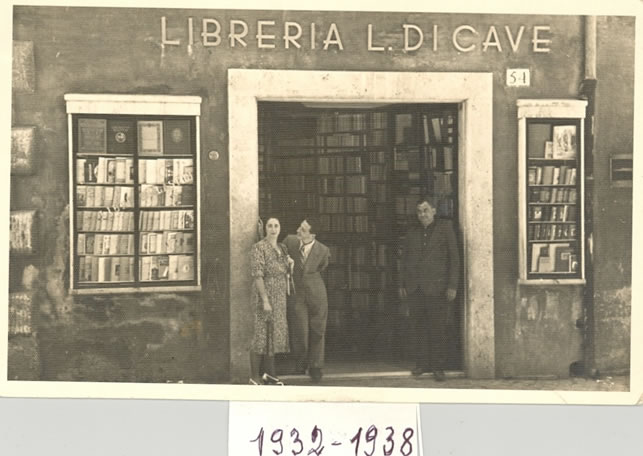
My uncle Raniero was a great expert of ancient books and directed his business mainly in this branch, my father, on the contrary, was interested in every kind of books, old autographed novels, French editions beautifully illustrated and, more or less in 1935, he decided to dedicate himself to the commerce of second-hand school books. His intuition was right and he achieved immediately a great success, becoming popular not only in Rome, but also in the outskirts of the city. In addition he organized some auction sale (Vendite all’asta), assuming the role of auctioner. I must admit he was successful. All seemed to walk smartly but many things happened after the war of Ethiopia.
Mussolini bound his (and Italy’s) destiny to the will of Germany and in 1938 all Italian Jews were marginalized and many laws were published against them.
A few months before the publication of the racial laws Adolf Hitler paid Mussolini a visit to Italy. When he came to Rome, during a visit to the Pantheon, the ceremonial procession passed in front of our shop. I remember Mussolini and Hitler sitting in an open car, side by side. I will never forget the iced stare of the Führer.
Let us go back to the racial laws: my worst memories are the prohibition to attend public and private schools and the shutting-down of our shop. All people who worked in public offices were expelled, many tradesmen were compelled to hand over the management of their firms, no radio was allowed in our houses, every public area, as swimming-pools or bathing establishments were forbidden. It was an unhappy day when we were informed of the revocation of the trading-license. But my father was a resolute man. He consulted with his brother who had to tackle the same problem, then he turned to one of his best friends and asked him to assume the management of the shop with his own name. This man hesitated a little: he had no familiarity with books and feared not to be equal to this task.
Eventually he accepted and the shop changed his name. As a matter of fact my father never left his shop and continued to be present to help the newcomer. Now the shop had to work for two families, so we were compelled to reduce all expenses. I missed very much the radio that had been taken away by the Police. In 1938, still twelve, I had no gramophone and radio was my unique link with opera and singers. A small crystal-set radio was not sufficient to substitute the old radio set.
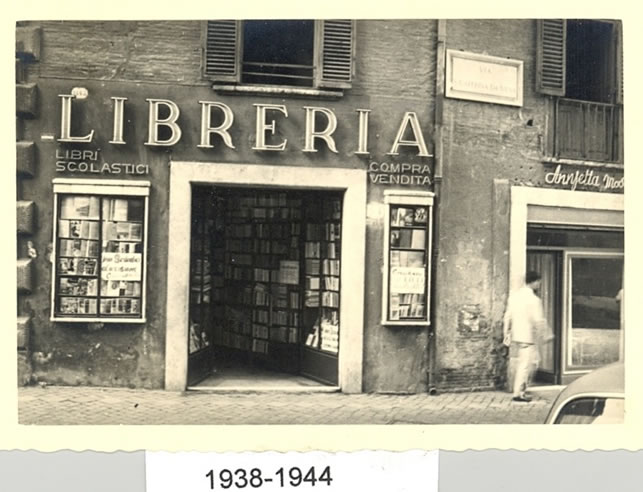
The Israelite Congregation of Rome succeeded in opening a school for us and we could follow our studies from inferior to superior classes.
It was a period of extreme bitterness and, with the outbreak of the second World War (in 1940 for Italy), I had my first contact with death: my father had always had a shop-assistant, a very good and hard-working man, whose name was Remigio. At the beginning of the war Remigio was recalled for military services and my father engaged a young man, nearly 18, his name was Amerigo. He stayed with us for nearly two years, then he too was called for military service. A brief period of training, soon after he was sent to Russia.
He never came back. One of his fellow-soldiers, wounded, succeeded in coming back to Italy and told us that Amerigo, during a battle, had been wounded at the abdomen by a burst of machine-gun fire.
Amerigo died, not yet 20, alone, without assistance, a man young, handsome, lively. It was a great sorrow for all who had known this young man in the shop, especially for my father who knew very well his father and his large family.
The war was disastrous for Italy: on July 19, 1943 Rome was violently attacked by American flying fortresses, soon after, on July 25 there was the fall of Fascism, on August 13 another violent air raid, on September 8th the armistice was broadcast in the whole Italy, immediately followed by the German occupation, the darkest period of our existence. After the request of 50 kgr. of gold to the Ebraic Congregation, on October 16 the Nazis began the real prosecution arresting in Rome more than 1000 Jews. My family and I left our homes and took refuge in a convent of friars. Many of them were customers of our shop and had always offered their help to my father. I think it is superfluous to describe all events that marked our life in that period, a period full of fears, troubles and sorrows. A bad day, perhaps the saddest in my life was January 13, 1944 when my aunt Pia, the youngest sister of my father, was arrested with her brother-in-law, another uncle of mine. All in our family adored Pia, and I can only imagine the feelings of my father who, like his brother, had a special preference for this sister. She was put in the prison of “Regina Coeli” and, at the end of February, transferred to the camp of Fossoli (Modena). Later the last travel to Auschwitz and, after, a complete silence.
The liberation of Rome was completed on June 4 1944 and we could have some respite, at last, but many of our relatives and friends were no more with us. My uncle Raniero, already suffering for his old infirmities, could not hold any longer and died a few months after the liberation of our city.
My father was able to recover his shop but he didn’t forget his friend who helped him in those dark days and, as soon he could dispose of some money, opened for him another bookshop.
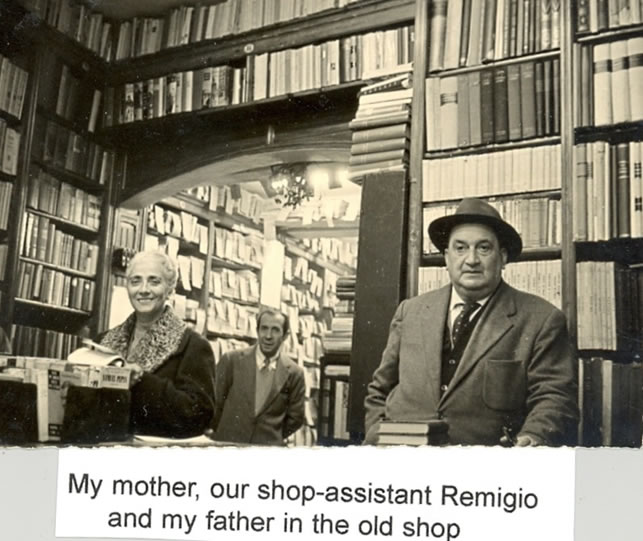
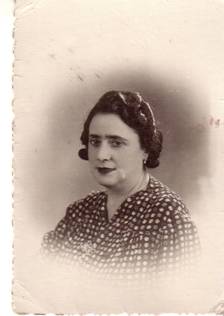 (Pia Di Cave)
(Pia Di Cave)
After obtaining my school-leaving certificate I spent some time studying English at the Cambridge University (in Rome). then I dedicated myself to the shop. I married in 1954. In 1961 my father was awarded with a golden medal for his many years of activity as bookseller. At the beginning of the sixties my father rented the shop adjacent to the old one and we divided our tasks: he remained in the old shop, I was destined to manage the new one. Everything went well till 1965, when my father fell seriously ill. I tried hard to continue with two premises, but it was not possible, even if I had engaged our faithful assistant Remigio. My father agreed with me and I left the old, glorious shop and chose the new one, more comfortable and rational. My father died in 1966, a loss unreplaceable for me. He had been a wonderful father, a great master of life. All I learnt about books and their commerce was due to him. The sixties, already saddened by his death, ended in a bitter way: in the Spring of 1969 I received a first threatening telephone call, full of insults against me, the shop and all the Jewish people.
Two letters with the same contents followed, but the telephone calls lasted for nine months. I found great comprehension and support from the Police, Carabinieri and the political Police.With my small tape recorder I recorded all the telephone calls, giving them to the Police. I remained always silent while the man, I could say a young man, expressed his delirious messages. At the beginning of 1970 this harassment ceased and, though the official enquiries revealed nothing I am sure that the guilty one(s) were detected and arrested.
Luckily the life of my shop and, consequentely mine, went on very well, calm and satisfactory. At the end of the seventies I decided to eliminate the commerce of school books and dedicate myself to art, literature, essay books, all the various branches of our commerce.
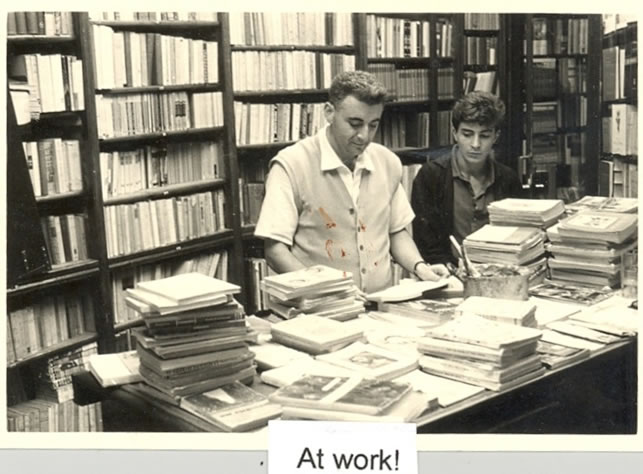
My mother died in 1988, at the age of 90. She had always contributed to the work of the shop, mainly during the period of school-books and all our customers were accustomed to see her at the cash register, always ready and diligent. Later, when my wife was pensioned,(she had worked for 40 years at Bank of Italy) she took part to the life of the shop and was enchanted by the various and different kind of customers. Now we must turn our thoughts towards the people who contribute to the positive results of a public shop: the customers. There are many kinds, young and old, students and professors, lovers of thrillers or art books, intellectual minds devoted to classics, architects and designers... and so on.
One of the most important was undoubtedly the President of the Republic, Giovanni Gronchi who visited my shop for three times and bought important books.
Before mentioning the names of the most famous people who patronized my shop I wish to remember two old customers (and my father’s friends) who had a deep passion for opera and singers: the first is Tommaso Scalzo, whose memories I have already published in “Opera Nostalgia” (Memorie di un appassionato), the other was onorevole Sorgonà, who was literary in love with the voice of soprano Amelita Galli Gurci. When they came to the shop, sometimes together, I guided them to my house (my father was still in good health) and left the gramophone at their disposal: the one preferred the voice of tenors, the other interested in all arias sung by Galli Curci. But, besides Galli Curci he was really fascinated by the duet “A la luz de la luna” by Michelena, sung by Caruso and De Gogorza.
We received often the visit of Trilussa, the famous Roman poet, (I was a child at that time), of famous writers as Elsa Morante and Raffaele La Capria, of art critics as Vittorio Sgarbi, the historical writer Denis MacSmith. Many prelates were often present, I remember Monsignor Giuseppe De Luca, a great connoisseur of ancient and modem books, very close to Pope Giovanni XXIII and Monsignor Funghini, a very important member of “La Sacra Rota”. The most important journalists of Italy were associated with my shop, Gorresio, Mauro, Gnoli, Calabresi who was for many years editor of “Il Messaggero”, Tommaso Smith, the founder of the glorious heading “il Paese”, and last but not least Eugenio Scalfari, founder of “La Repubblica”. One of my most affectionate customers, onorevole Fabrizio Dezan, insisted that I accepted the title of “Cavaliere del lavoro” and another customer, a Dominican Friar, professor at the Gregorian university, mentioned me for the golden medal sponsored by the Tourist Co., in 1978. As you can imagine my greatest joy was when opera singers entered my shop:
I remember Paolo Silveri, Maria Benedetti, Hermann Prey, Otello Borgonovo, Jole Jacchia, Misha Raitzin, Sylvie Valayre, Boris Christoff, Giuseppe Gismondo, with whom I had interesting conversations, Luigi Infantino. The latter arrived always with Maestro Francesco Siciliani, one of the most considered manager of the lyric world. When Siciliani discovered my love for opera and singers, he was pleased with my interest and was an endless source of memories, anecdotes and news that formed part of the lyric world.
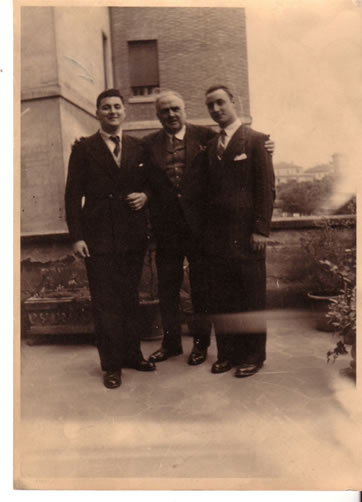 (LDC-Riccardo Stracciari and Otello Borgonovo in their students' days)
(LDC-Riccardo Stracciari and Otello Borgonovo in their students' days)
Editor’s note:
I specifically asked Luciano to expand a bit on the famous singers who came to the shop and asked him to answer my following questions :”When and why did they come into the shop? Were they bookreaders or did they just pass by and wanted to browse a bit? Did they look for a specific book? Did they actually buy book? Do you remember what book(s) they were looking for? Did you have a conversation with them? Do you remember anything like the ones with Gismondo? Did Christoff behave like a superstar or was he pleasant? Anything you remember from the anecdotes of Siciliani? Why did he always come with Infantino?
Let us begin with Boris Christoff: the first time he came to the shop I was absent and my father told me later of his entering our shop. He bought a big collection of books: “The dictionary of literary works” (9 volumes) and the “Dictionary of authors”, (3 volumes). The second time he came with his car to pick-up the books I was present. I have always admired his art, a little less his voice, but it was a memorable event to know such a famous singer. No, he didn’t behave as a superstar, but was not very communicative either. A great difference with Paolo Silveri and Hermann Prey. Paolo Silveri came to my shop as he was told I had in my collection the complete Traviata he had sung at RAI in 1951 with Pagliughi and begged me to dub a copy for him. He was so kind that I could only say yes and after a week I gave him the copy as requested. After a few days he came again in my shop with a bottle of cognac. Moreover he bought one book as he had to make a present to a friend. Some months later Silveri took part in a broadcast and among other arias in the program he proposed the duet from Traviata with Pagliughi and had for her only words of appreciation and admiration. Having listened to the broadcast I telephoned him and told him how much I had appreciated his words. He asked me the telephone number of Pagliughi and called her. When I spoke with Pagliughi later she was pleased with his kindness.
Hermann Prey came to my shop in 1966 accompanied by a beautiful lady, perhaps his wife, and asked me something about ancient music. In that moment I had only one volume on this argument but it was not what he was looking for. I gave him the addresses of three shops specialized in music and he thanked me for my collaboration. Some days later I received his photo.
Misha Raitzin and Sylvie Valayre came together. They were singing at that period at the Teatro dell’Opera (Russian repertoire) and asked me to see my book “Mille voci e una stella”. In it I had mentioned the name of Misha Raitzin, and somebody had told him of his chapter in the book. They bought two copies of the book.
Maria Benedetti I identified as soon as she entered my shop, a tall and imposing figure. She wondered if I knew her but I had listened to her many times at the Teatro dell’Opera. I don’t remember exactly what she bought. I regretted that she had not been present in the recording rooms and she answered that when she had been called she could not fulfill this request.
Giuseppe Gismondo came to buy school books for his son and, having known of my love for opera and singers visited my shop frequently. We talked about singing technique and he told me about his most important performances. The most amazing singer with whom he had sung was Birgit Nilsson in Turandot.
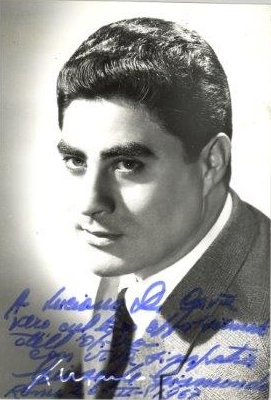 (Giuseppe Gismondo)
(Giuseppe Gismondo) 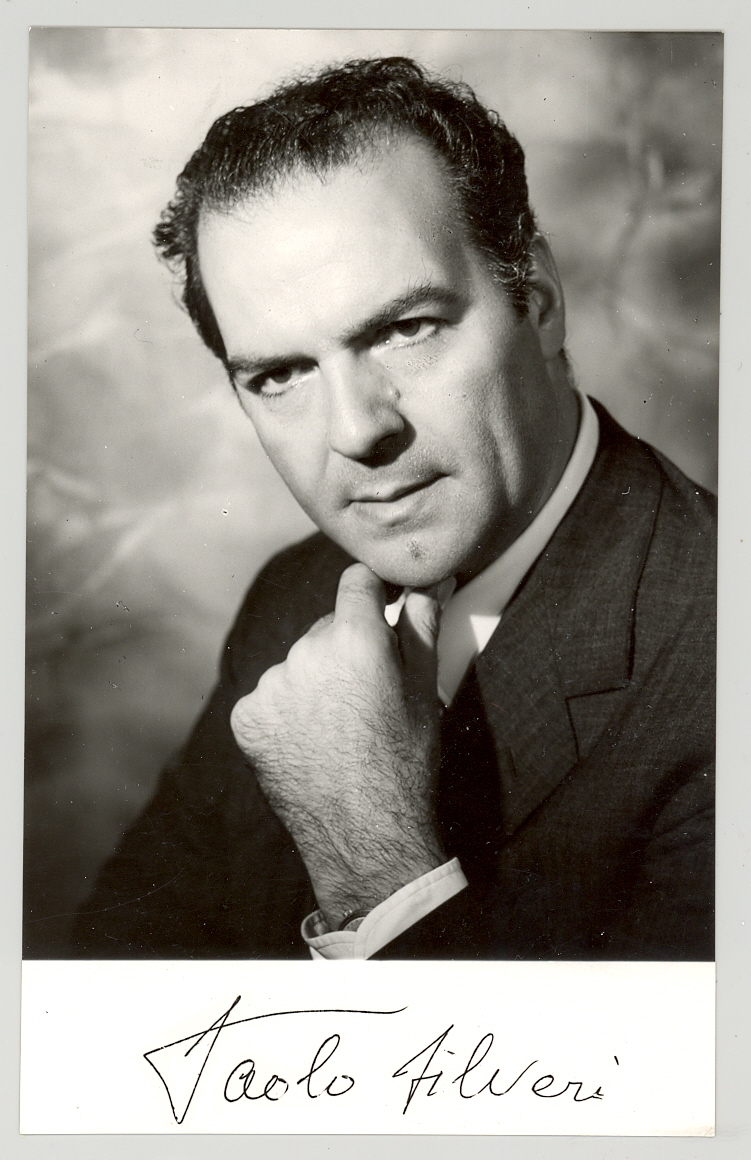 (baritone Paolo Silveri)
(baritone Paolo Silveri)
About Siciliani and Infantino, it was the latter who came with the Maestro,
I have seen him three or four times. On the contrary Siciliani, who came always with a car and his driver, came for many years, as long as he was in good health. He was a good customer, interested in historic and art books. He was really an extraordinary talent-scout and we talked about the fabulous performances organized by him at La Scala, at Maggio Musicale Fiorentino and at Italian RAI. He turned to better account the artistic abilities of Maria Callas and Montserrat Caballè. The latter took part, (1969-1972) in beautiful performances at RAI of Agnese di Hohenstaufen by Spontini (with Antonietta Stella), Ernani and Un Ballo in Maschera by Verdi, la Donna del Lago by Rossini and Salome by Richard Strauss.
Jole Jacchia and the son of Vasco Campagnano came because I had written to them to know something more about their careers. Otello Borgonovo has always been a dear friend for me and he came whenever he happened to be in Rome.
I regret that Lina Pagliughi, my favourite singer, never came to my shop, she didn’t sing frequently in Rome, moreover I knew her personally from 1965 onwards. But there is a link between her and the books. She told me she loved reading a lot and when she knew I was a bookseller she said there was a book she would like to read. In Milan it was impossible to find. It was a fine novel by Milli Dandolo, “Croce e delizia”, issued by Mondadori, about the life of a famous soprano, of course, in the lyric world. I promised to look for it and, (good luck!) found it. I sent the book to her and she was delighted in receiving it. Later she told me she had much enjoyed the novel. I too had read the book and found it pleasant and interesting. It would be nice if somebody could translate it. (It is a big volume). Another famous singer who didn’t visit the shop but was somehow involved with it was Gianna Pederzini.
When I visited her the first time she asked me about an interesting book entitled “il Terzo occhio” (the third eye) by a famous Lama of Tibet and, at my second visit I gave it to her.
Two famous actors I knew in my shop were Vittorio Gassmann e Franca Valeri.
In a separate list I wish to remember the great friends who have been linked to my shop both for books and for records. First of all avvocato Mario Martinez, who was one of the most famous record collector of Rome. A highly cultured man he had already been one of my father’s customers, but when we met a deep friendship cemented between us and it lasted until his death. Then Silvio Serbandini, perhaps the greatest fan of Giacomo Lauri Volpi, Giorgio Sani from Genoa, Maurizio Tiberi whom I knew when he was still very young. His Clama CDs have always appeared in the windows of my shop and I must say they sold very easily. Could I forget Eddie Smith, so fond of music but also of antics, Richard Bebb and Charles Mintzer? Nor can I forget Michael Aspinall and Michael Scott. And, last, but not least Rudi Van den Bulck, now among my dearest friends, whom I met for the first time in my shop.
There is something else that links my shop to my passion for music: in the mid-sixties I had an idea: I had always loved collecting records, but, because of my work, I had no time for important researches. So I put up, in the window of the shop, a written message: “We buy old 78 operatic records, only singing”. The message worked well and, thanks to it, I have found a lot of interesting records. Some of my friends benefited from this idea and one of the most interested in it was Richard Bebb.
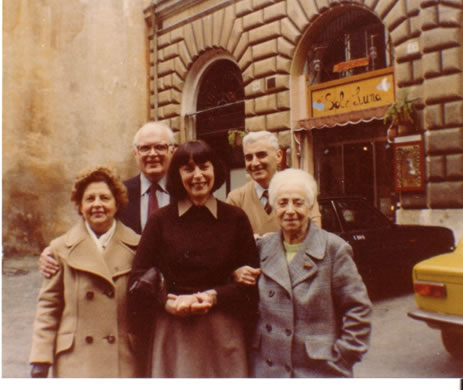
(Luciano’s wife, Richard Bebb, Gwen Watford, LDC and his mother)
In the last times, thanks to the advertisement, I have acquired a new friend, an Australian attorney, Douglas Hassall. He sends his mails continuously and I am very pleased to have a contact in so distant a land. Another small episode is connected to this request: the director of a German Movie-house looked at my window and told me he needed a 78 record for a scene of a motion picture. The scene was placed in Germany in the early thirties. He was very attentive to details and was looking for an original 78 record, possibly with its authentic cover.
-Do you have one to rent me? - he asked. - Yes, I had and, later, I gave him a 78 Telefunken record sung by the German soprano Hilde Konetzni, with its original cover. When, some days after, he returned the record to me, he appeared considerably satisfied.
I have ceased my activity in 2007, when I was well on in years. I had never been alone in my shop, with my father, my mother, my good assistant Remigio, my beloved wife. Now I was completely alone and could not bear this state of things. So I decided to hand over the management of my activity and found my heir in a very good friend of mine, Paolo Cremisini, (1)who had always lived among books. Very kindly he asked me to continue with the sign-board “Libreria Di Cave” and I agreed very warmly.
I hope to have made an exhaustive study of this subject, even if I am sure to have neglected thousands of details.
Today there are fine words about digital books that could take the place of the traditional old volumes. They have their importance, it is true, but nothing will be able to replace the perfume of the paper, the preciosity of a fine binding, the splendour of the colours of photos, the pleasure one obtains turning over the pages of a book. And above all, for a bookseller or a customer to be in direct touch the one with the other.
Luciano Di Cave, Rome June 2014
(1) Cremesini sadly passed a few months later, followed by Luciano's own death thus sadly ending one of the Rome landmarks